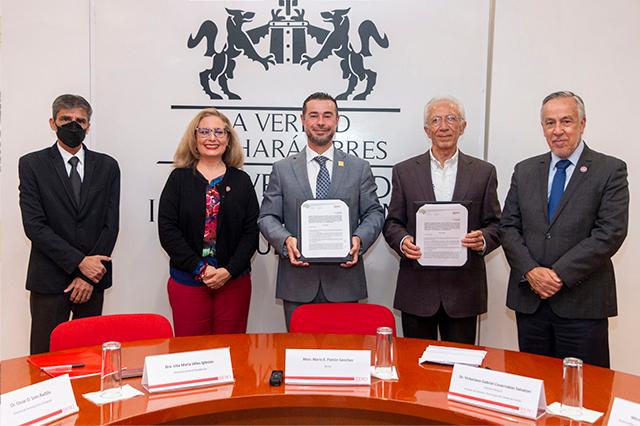The marathon day of university reflection held by the IBERO Puebla ended. The anniversary of the disappearance of the 43 normalistas from Ayotzinapa has been marked on the institutional calendar as a date of denunciation and collective action. In recent times, it has also been an incentive to engage the Student Community in a series of reflection exercises on the role of Jesuit universities in a broken world.
Mario Patrón Sánchez led the closing of the event with a call to adopt a culture of care as an attitude that confronts the violence that has appropriated public and private environments. “We talk about care as something that is built with acts and community ties.”
We recommend you: IBERO High Schools evaluate the year of transition to face-to-face attendance in reports
The day has been an opportunity to honor the 43 normalistas of Ayotzinapa, but also the Jesuit priests murdered in Chihuahua and the thousands of people who have been victims of violence in recent times. Year after year, its purpose is to illuminate actions that IBERO Puebla carries out together with social actors in order to find hopeful answers.
Related note:
IBERO Puebla and CONCYTEP formalize strategic working alliance
The reflection spaces must be the beginning of a work that allows promoting the collection of university voices and perspectives. “Thank you very much for betting with us to make words seeds from which fruits of hope sprout”, closed the Rector.
Jesuits against injustice
The Society of Jesus was established in New Spain in 1608. After years of resistance by the Rarámuri populations, a reciprocal interaction was reached that allowed dialogue processes with full respect for native traditions. The exchange has found different channels throughout history after the expulsion of the Jesuits in 1767 and their eventual return in 1816.
Javier Campos and Joaquín Mora, the priests assassinated in the Sierra Tarahumara last June, are proof of the dialogue of knowledge that takes place in the region. As the journalist Luis Hernández Navarro explained during the last conversation of the day, both Jesuits contributed to the promotion of the native Church, one that turned the inhabitants into builders of their own faith and not into objects of evangelization.
Related note:
IBERO Puebla promotes Circular and Social Bioeconomy Strategy
We suggest reading: IBERO Puebla regrets the position of the CNDH on the National Guard
His work, as mandated by Ignatian spirituality, was focused on the protection of the discarded of the world. Thus, both parents, who inhabited the mountains for more than 50 years, gave their lives to protect a person who was persecuted by organized crime.
The El Paso-Juárez corridor is one of the most profitable for drug trafficking. The US DEA estimates that up to 70% of the cocaine that reaches North America does so through this route. “What is lived in the Tarahumara is a narco-saw that has made this way of life something ordinary,” lamented the journalist.
Ignacio Ellacuría, SJ was assassinated when he was rector of the UCA in El Salvador. The priest became a martyr of the Jesuit community, but also one of the greatest sources of knowledge to articulate the foundations of an Ignatian-inspired pedagogical paradigm.
One of his main legacies is the highest task of the university: to take charge of the defense of the historically dispossessed popular majorities. “Universities are historical and political”, thought Ellacuría. At the same time, he proposed that the truth emanating from knowledge should be used as a tool to reach justice.
Rosario Arrambide González, director of the Ignacio Ellacuría, SJ Human Rights Institute (IDHIE) of IBERO Puebla, stated: “A Jesuit university has to take charge of reality. On the one hand, there is academic excellence, but the other dimension is social transformation: sensitive men and women forms. That is the hallmark of Jesuit universities.”
“In addition to coming to this university to professionalize, give yourself the opportunity to approach these spaces that allow you to have contact with reality”: Rosario Arrambide.
The University is located in a context of serious human rights violations: human trafficking, gender violence, discrimination, violent deaths and impunity, among many others. The duty of Jesuit schools, he added, is to train people who put their skills and sensitivities into accompanying victims of violence.
Read more: Ibero Puebla celebrates recovery after covid-19 pandemic
From the Citizen Security Program of the IBERO Mexico City, it has been found that people, in general, do not see a way out of violence; their biggest concern is that their lives will be controlled by criminality. This space defines security as a “public good that enables democratic modes of coexistence to reduce fear and damage.”
For Ernesto López Portillo, a collaborator of the program, the crises of violence have been prolonged by the excessive use of force, as well as the persistence of government public policies with unilateral approaches, the predilection for police knowledge and the reproduction of sexist practices.
Among the alternatives offered by the program is the consolidation of citizen advocacy spaces; the construction of platforms that configure new narratives; the creation of specialized education programs; and a democratic police reform.
Jesuit universities heed the call to confront violent contexts | e-consulta.com

